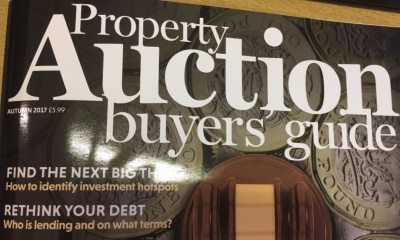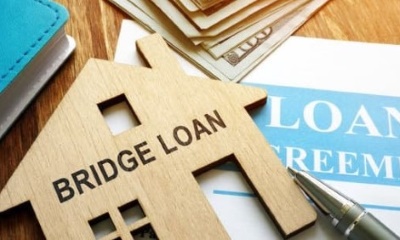Think your winning bid is all you'll have to pay at auction?
Publish Date: 19 October 2017
By Beth Fox

Further reading
The Benefits of Selling at Auction
5 Success Strategies for making money when buying property at auction
EXPECTED EXTRAS!
The Property Auction buyer's guide, Autumn 2017 issue is out now including a featured article from EIG Managing Director, David Sandeman.
"Think your winning bid is all you'll have to pay at auction?"Think again says David Sandeman. Get prepared with this guide to the fees, taxes and extra legal liabilities you are likely to encounter.
INSIGHT : Fees & Costs
Is the "hammer price" all you pay when yours is the winning bid on a property at auction? The short answer is "no". You may be liable for a number of different fees and costs when purchasing a property at auction. Therefore, when you are carrying out due diligence on a property, it is important to find out the extent to which additional fees and costs will be payable over and above the hammer price. These could add significantly to the total cost of the project - in some extreme cases, well in excess of 10%.
What's more, most, if not all, of these fees will fall outside what a lender will assist with, and will have to be funded from other means. For example, let's say you have a line of funding that will supply 75% of the hammer price, and you purchase a lot for £200,000. In addition, there is a total of £15,000 in acquisition costs such as stamp duty, buyer's premium and contributions to vendor costs. The total cost of acquisition would be £215,000, but the lender will only lend 75% of the hammer price of £200,000 and not 75% of the total costs of £215,000. You will need to fund 100% of these additional costs.
So what are the potential additional costs?
Stamp Duty SDLT
This is a duty payable to HMRC, subject to the sale price being above certain thresholds, whenever a property is sold. The amount payable despends on four main factors:
- Both residential & commercial have a threshold under which no stamp duty may be payable.
- Is the property residential or commercial? Different rates apply and, in general, commercial stamp duty is smaller.
- Is the purchaser a person or a non-natural entity? Different rates apply.
- If the purchaser is a person who already owns an interest in another property, they will be required to pay a surcharge of 3% on top of the standard rate.
Generally, the higher the price, the greater the percentage payable on the total value.
SDLT is a complex calculation. You should either use an online calculator (HMRC has a good one) or ask a solicitor or accountant to advise you based on your personal circumstances.
The liabilty can be significant. For example, an individual buying a house for £750,000 to rent out and who already owns his own home will pay £50,000 in SDLT (6.6% of the purchase price).
Buyer's Administration Fees
Most auctioneers charge a buyer's administration fee, payable by the purchaser on exchange of contracts as a payment separate to the deposit, which is also payable at that time. The fees, which are a fixed amount and not a percentage of the hammer price, are always included in the auctioneer's guide to buying at auction, which you should read carefully. I have seen fees levels range from £195 to £850 including VAT, though some auctioneers charge even more (or less). In addition, some auctioneers have a price threshold below which a reduced buyer's administration fee is payable.
Buyer's Premium
The vast majority of auctioneers charge the vendor a catalogue entry fee and a percentage commission on the final sale price, and do not charge the purchaser a buyer's premium (a percentage of the hammer price) as well. However, a growing trend is for auctioneers to accept entries for sale by auction on the basis that the seller will not be charged anything by the auctioneer, and the auctioneer will look to the successful purchaser to pay a percentage premium as a fee.
Again, this will be clearly set out in the catalogue and you must make yourself aware of the potential liability you will have if you are the successful purchaser. The percentage ranges from 1% to 3.5% (plus VAT) and some are subject to a minimum fee as well. For lower-value properties, this can have a significant effect on what you pay. For example, one firm has a minimum fee of £5,000 plus VAT, which equates to £6,000, and this would be payable even if the hammer price of the property was only £30,000. In this instance, the cost of the property would increase by 20%.
Special Conditions of Sale
I should stress, though, that significant charges for the vendor as part of the special conditions are the exception rather than the norm. Be aware that some solicitors will draft a clause with, say, "2% in it as "two percent", making it more difficult to spot when skim-reading the special conditions.
The type of additional liabilty you might well find in the "specials" are:
- Contribution to vendor's legal fees, which could be a fixed fee (sometimes several thousand), though a figure nearer 2% is more common.
- Cost of local authority search fees, which could be in the region of £300.
- Overage clause - if you were looking to buy a site or piece of land, the vendor's solicitors could insert a clause stating that if you were to get planning permission for the land after completion, you would then have to pay the vendor a percentage of the uplift in value as a result of the uplift in value as a result of the planning permission. You would need to budget for this eventuality.
Other recommended resources:
Auction essentials - You can find more information about how to get started in auctions in the EG Beginner's Guide, including how to buy at auction, understanding the guide price, and a glossary of auction terms.
Download your digital edition of the guide at http://bit.ly/2flWbUf
Please note that the above article is for information purposes only and you are strongly recommended to seek professional advice to ascertain the exact breakdown of additional costs.
Want to see what is coming up for sale in your area or what price properties have sold for?
You need access to www.eigpropertyauctions.co.uk, the only site with information on virtually every lot coming to auction. Get access to industry knowledge with full visibility of what is coming up for sale and what similar properties have sold for.
Try it for free, call us now to experience your no obligation trial: 01737 226150
Essential Information Group - News and Information
Keep up to date with our latest news, case studies and what's going on in the property auction industry on our blog.

Buying at auction
20/03/2025
Why the Property Auction Market is Booming Due to Stamp Duty Changes
The UK property auction market is experiencing a surge in activity in March 2025, driven primarily by impending changes to stamp duty regulations

Buying at auction
27/02/2025
Who Can Benefit from Buying a Property at a UK Property Auction?
Buying a property at a UK property auction can be advantageous for various buyers depending on their financial situation and goals. Auctions often offer unique opportunities, discounted properties, and a fast purchase process. Here’s who can benefit the most.

Buying at auction
24/02/2025
Bridging Loans Explained: A Guide for Property Auction Buyers
A bridging loan is a short-term financing solution, typically lasting up to 12 months. It provides immediate funds to bridge the gap between purchasing a property and securing long-term financing.